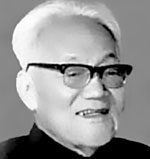
Faces & TracesPa Chin: A literary and revolutionary Chinese anarchist [Archives:2007/1116/Culture]
December 31 2007
 |
Li Yaotang, whose courtesy name was Li Feigan, was a Chinese novelist, short story writer, essayist, translator and intellectual who wrote under the pseudonym Pa Chin (also Ba Jin) taken from the Chinese transliterations of the first syllable of Mikhail A. Bakunin and the last of Peter A. Kropotkin, both Russian anarchists he admired.
Pa Chin was born in 1904 into a wealthy family in Chengdu, capital of southwest China's Szechuan province. After his parents died when he was 12, family authority passed to his despotic grandfather, who forbade him from entering a modern school.
Family feuding broke out in 1917 when Pa Chin's grandfather died and authority transferred to an elder uncle.
Known as the May Fourth Movement, the 1915-1922 New Culture Movement reached Chengdu and the new literature came into Pa Chin's hands at age 15. Affected by the popular anarchic publications of Kropotkin and Emma Goldman, as well as seeking an escape from his patriarchal and feudalistic family home, he joined local anarchist group, the Equality Society.
In 1920, Pa Chin enrolled in the Chengdu Foreign Language Specialist School to study English and engaged in organizing the Crescent literary journal.
Pa Chin left Chengdu in 1923 to study, moving to Nanjing and Shanghai, where he entered a prep school affiliated with Southeast China University, after which he attended Dongnan University, mastering Esperanto and vehemently continuing his anarchist activism.
In January 1927, Pa Chin left China for further studies in France, where he joined a group of young Chinese anarchists and other exiles of various nationalities. He spent the next 22 months in Paris in the small town of Chateau-Thierry on the Marne River.
Except for studying French language, Pa Chin didn't pursue much formal education, but he read widely on philosophy and social problems, as well as Western fiction.
Upon returning to Shanghai in 1928, Pa Chin continued writing and working on translations and found himself an acclaimed writer.
He spent the Second Sino-Japanese War (1937-1945) in China, moving to a succession of wartime capitals before finally returning to Chengdu. Actively involved in propaganda against the Japanese invasion, he worked on the publication, Nahan (Outcries), and was one of the leaders of the All-China Association of Artists and Writers for Resistance.
Pa Chin served as editor-in-chief of Shanghai's Cultural Life and Pingming publishing houses in 1944. Choosing to remain in China following the 1949 Communist takeover, he also was chief editor of the Shanghai-based Literary and Art Monthly, as well as Harvest and Shanghai Literature.
Additionally, Pa Chin was a foreign correspondent in Korea for seven months in 1952 before being elected vice chairman of the China Writers' Association in 1953. As a correspondent, he also visited Japan in 1961 and was elected chairman of the Shanghai Federation of Literary and Arts Circles in 1962.
Branded a counterrevolutionary during the 1966-1976 Cultural Revolution, Pa Chin therefore was purged and didn't reappear until 1977, after he had been rehabilitated considerably. Consequently, he was elected a deputy to the 1978 National People's Congress, followed by chairman of the China Writers Association in 1983.
Pa Chin's literary works have been translated into and published in numerous foreign languages. He also has received prizes and medals from Italy and the former Soviet Union for his contributions in translating and introducing foreign literary works to the Chinese people.
In the two decades before the late 1950s, Pa Chin wrote nearly 20 novels and translated just as many foreign works, as well as more than 70 short stories. While studying in France in 1927, he began writing his first novel, “Mieh-wang” (Destruction), about the life of a young Shanghai revolutionary anarchist.
Pa Chin is most acclaimed for his autobiographical “Turbulent Stream” trilogy, including his masterpiece, “Chia” (Family, 1931), and the trilogy's other two novels, “Spring” (1938) and “Autumn” (1940). Describing the struggle between young intellectuals and their family traditions, the trilogy became a classic in modern Chinese literature.
In 1934, Pa Chin completed his Love trilogy, consisting of the novels “Fog” (1931), “Rain” (1933) and “Lightning” (1935), in addition to a novelette, “Thunder.” His Love trilogy describes the life of revolutionary intellectuals and other vital problems as the purpose of human life, friendship and love.
Beginning with the battle for Shanghai, Pa Chin's three-volume novel, “Fires” (1941-1945), tells the story of this new, often heroic, generation. Among his other works from the postwar period are the short novels, “A Garden of Repose” (1944) and “Ward No. 4” (1946), while another of Pa Chin's masterpieces, “Han-yeh” (Cold Nights, 1947), tells the story of a couple whose dreams are shattered by the war and the tragic loss of their idealism.
Between 1978 and 1986, Pa Chin penned a series of 150 essays entitled, “Suixiang Lu” (Random Thoughts), largely dealing with China's Cultural Revolution. He also translated literary works by Russian and French writers, winning him the 1982 Dante International Prize and being nominated for the 2001 Nobel Prize in Literature.
In his later years, Pa Chin was stricken with a form of Parkinson's disease in 1983 before dying at the ripe old age of 101 in Shanghai on Oct. 17, 2005. His death marked the end of an era in Chinese literature, as he was the last major writer alive during the May Fourth Movement.
——
[archive-e:1116-v:15-y:2007-d:2007-12-31-p:culture]


